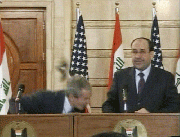BAGHDAD (AFP) – Iraq faced mounting calls on Monday to release the journalist who hurled his shoes at George W. Bush, an action branded shameful by the government but hailed in the Arab world as an ideal parting gift to an unpopular US president.
Colleagues of Muntazer al-Zaidi , who works for independent Iraqi television station Al-Baghdadia, said he “detested America” and had been plotting such an attack for months against the man who ordered the war on his country.
“Throwing the shoes at Bush was the best goodbye kiss ever… it expresses how Iraqis and other Arabs hate Bush,” wrote Musa Barhoumeh, editor of Jordan’s independent Al-Gahd newspaper.
In Washington Zaidi was labelled an attention seeker.
“There is no way of knowing what the motivation of the individual was — he was obviously trying to get attention for himself,” State Department spokesman Robert Wood told reporters.
“This was one incident and one individual’s views, but if you look at the direction we are heading in Iraq now, it’s a very, very positive direction and we hope to see that continue.”
The Iraqi government branded Zaidi’s actions as “shameful” and demanded an apology from his Cairo-based employer, which in turn called for his immediate release from custody.
Zaidi jumped up during a joint a news conference with Iraqi Prime Minister Nuri al-Maliki on Sunday, and shouted: “It is the farewell kiss, you dog,” and threw two shoes at the US leader.
The shoes missed after Bush ducked and Zaidi was wrestled to the ground by guards. He is currently being held by the Iraqi authorities, a source in Maliki’s office said without elaborating.
Hundreds of Iraqis joined anti-US demonstrations to protest at Bush’s farewell visit to Iraq, which was plunged into a deadly insurgency and near civil war in the aftermath of the 2003 invasion.
Wood said the shoe-throwing incident overlooked the good work Washington has carried out in the country and did not represent the feelings of all Iraqis.
Al-Baghdadia issued a statement demanding Zaidi’s release “in line with the democracy and freedom of expression that the American authorities promised the Iraqi people.”
“Any measures against Muntazer will be considered the acts of a dictatorial regime,” it added.
Saddam Hussein’s former lawyer Khalil al-Dulaimi said he was forming a team to defend Zaidi and that around 200 lawyers, including Americans, had offered their services for free.
“It was the least thing for an Iraqi to do to Bush, the tyrant criminal who has killed two million people in Iraq and Afghanistan,” said Dulaimi.
“Our defence of Zaidi will be based on the fact that the United States is occupying Iraq, and resistance is legitimate by all means, including shoes.”
Zaidi’s colleagues in Baghdad, where he had worked for three years, said he had long been planning to throw shoes at Bush if ever he got the chance.
“Muntazer detested America. He detested the US soldiers, he detested Bush,” said one on condition of anonymity.
Soles of shoes are considered the ultimate insult in Arab culture. After Saddam’s statue was toppled in Baghdad in April 2003, many onlookers pelted it with their shoes.
Few ordinary Iraqis expressed much sympathy for Bush but views on the journalist’s actions were mixed.
In the Shiite radical stronghold of Sadr City, where anti-US sentiment runs deep, protesters threw shoes at passing US military vehicles, while in the central shrine city of Najaf, crowds chanted “Down with America.”
But Baghdad shopkeeper Hamza Mahdi, 30, was critical.
“I don’t like Bush, but I don’t agree with this action — it’s not civilised,” he said. “Journalists should use pen and paper to make their point and not their shoes.”
One of his customers, Um Seif, 45, disagreed. “Me, I support him. Everyone should support him,” she said. “Don’t you remember what the Americans did to us? Have you already forgotten?”
An Iraqi lawyer said Zaidi risked a minimum of two years in prison if convicted of insulting a visiting head of state.
But in Libya, a charity headed by Moamer Kadhafi’s daughter Aisha announced it would award Zaidi an “order of courage” for his actions. In Lebanon, the Shiite militant group Hezbollah said he should be regarded as a hero.






Leave a Reply